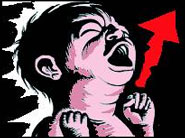25 November 2011
By Basavaraj F Kattimani
Hubli India
Early Marriages, Delivery At Home To Blame
The number of infant deaths is on the rise in Bidar district, one of the most backward districts of Hyderabad–Karnataka region. The district health department made a startling revelation that 2,219 infants had died immediately or within a year of birth in the past three years – from 2008–11.

Besides, in this timeframe, 150 mothers also died after giving birth. Keeping a check on the death of infants and mothers has now become a challenge for the district health department.
District health officer Dr Babaurao Bellad told TOI: "Infant deaths are occurring mainly due to asphyxia problems, premature deliveries, lack of nutrition, low birth weight and development of congenital anomalies. Early marriages, lack of awareness about safe delivery and unsafe deliveries at homes are the main reasons for the death of mothers."
According to district health office sources, 534 infants died in 2008–09, 785 died in 2009–10, 618 infants died in 2010–11 and 282 children died from April to October, 2011. While 47 mothers died after giving birth in 2008–09, 44 mothers died in 2009–10, 44 died in 2010–11 and 15 mothers died from April to October, 2011.
In Karnataka, the Maternal Mortality Rate (MMR) is 135–140 per lakh, while the Infant Mortality Rate (IMR) is 35–40 per 1,000, as per the National Rural Health Mission report.
Bidar reported an IMR of 16% in 2008–09, 26% in 2009–10 and 2010–11, and has registered 15% till today this year. "We are seriously trying to bring down the IMR and MMR in the district, and regularly monitoring the steps taken by PHCs, health workers, Anganwadi and Asha workers, to enable women to follow precautionary measures while giving birth, and to nurture the child till one or two years," Bellad said.
He also said that people should not resort to deliveries at home, but should bring pregnant women to hospital for proper care.
Action would be taken against errant Anganwadi workers who fail to provide nutritious food to both mothers and children in the villages, he said.






